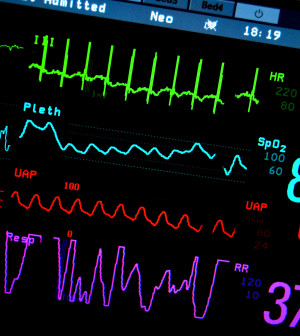- 10 Strategies to Overcome Insomnia
- Could Artificial Sweeteners Be Aging the Brain Faster?
- Techniques for Soothing Your Nervous System
- Does the Water in Your House Smell Funny? Here’s Why
- Can a Daily Dose of Apple Cider Vinegar Actually Aid Weight Loss?
- 6 Health Beverages That Can Actually Spike Your Blood Sugar
- Treatment Options for Social Anxiety Disorder
- Understanding the Connection Between Anxiety and Depression
- How Daily Prunes Can Influence Cholesterol and Inflammation
- When to Take B12 for Better Absorption and Energy
Why Heart Failure Patients Often Get Too Little Exercise

A number of obstacles prevent heart failure patients from getting enough exercise, a new study has found.
Supervised aerobic workouts benefit people with heart failure. But a lack of social support and barriers — such as child care — means that many patients don’t get the recommended amount of exercise, researchers found.
They looked at more than 2,200 heart failure patients enrolled in a 36-session supervised exercise program for three months, followed by two years of home exercise.
Participants also answered questions that measured their perception of social support and assessed potential barriers, such as finances and weather, that could interfere with participation in an exercise program.
Those with the most social support averaged 118 minutes of exercise a week after 12 months, compared with an average of 92 minutes for those with the least social support. Those with the fewest barriers averaged 86 minutes a week, compared with 79 minutes for those with the most barriers.
The study was published Nov. 17 in the journal Circulation: Heart Failure.
“Patients, family members, and healthcare providers should work together to find solutions to the barriers preventing a patient from participating in structured exercise programs, because exercise programs can help patients manage their condition,” lead author Dr. Lauren Cooper, a fellow in cardiovascular diseases at the Duke University School of Medicine, said in a journal news release.
Heart failure means the heart isn’t pumping blood as well as it should, causing fluid to build up in the body.
Previous research found that heart failure patients who did moderate exercise had a lower risk of being hospitalized for heart failure or of dying from heart disease.
“Competing responsibilities and lack of support may prevent patients with heart failure from participating in exercise programs,” Cooper said. “Assessing a patient’s social support system and barriers that may interfere with their exercise program may help medical professionals to customize exercise programs that better fit individual patient needs.”
More information
The American Academy of Family Physicians has more about heart failure.
Source: HealthDay
Copyright © 2026 HealthDay. All rights reserved.










